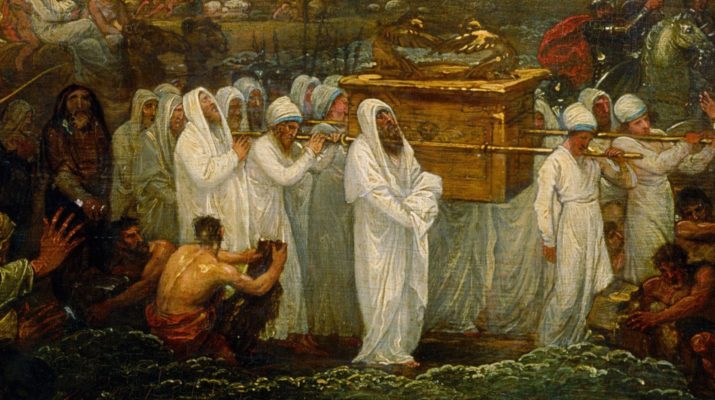Joshua 3:7-17
Proper 26A
BibleHub
7 The LordA said to Joshua,B “This day I will beginC to exaltD you
Notes on verse 7a
A “Lord” = YHVH. From havah (to be, become) or hayah (to come to pass, become, be). This is the name of the God of Israel, the self-existent and eternal one, the tetragrammaton. This pronunciation has been lost to time so “Lord” is generally used in its place.
B “Joshua” = Yehoshua. Related to “Lord” in v7. From YHVH (see note A above) + yasha (to deliver, defend, help, preserve, rescue; properly, to be open, wide or free, which implies being safe. So, in a causative sense, this is to free someone). This is Joshua, Jeshua, or Yehoshua, which means “the Lord is salvation.”
C “begin” = chalal. This is to pierce, which implies to wound. It is used figuratively for making someone or something profane or breaking your word. It can also mean to begin as though one opened a wedge. Also, to eat something as a common thing.
D “exalt” = gadal. This is to grow up, become great, become wealthy – to advance. The root meaning may be to twist in the sense of the process of growing.
in the sightE of all Israel,F so that they may knowG that I will be with you as I was with Moses.H
Notes on verse 7b
E “sight” = ayin. This is eye in a literal or figurative sense so eye, appearance, favor, or a fountain (the eye of the landscape).
F “Israel” = yisrael. From sarah (to persist, exert oneself, contend, persevere, wrestle, prevail) + el (God or god). This is God strives or one who strives with God; new name for Jacob and for his offspring. This refers to the people and to the land.
G “know” = yada. This is to know, acknowledge, advise, answer, be aware, be acquainted with. Properly, this is to figure something out by seeing. It includes ideas of observation, recognition, and care about something. It can be used causatively for instruction, designation, and punishment.
H “Moses” = mosheh. From mashah (to pull out in a literal or figurative sense, to draw out) OR from Egyptian mes or mesu (child, son i.e. child of…). This is Moses – the one drawn out from the water, which is to say, rescued. If derived from the Egyptian, his name would share a root with Rameses and Thutmose.
8 You are the one who shall commandI the priests who bearJ the arkK of the covenant,L ‘When you come to the edge of the waters of the Jordan,M you shall stand stillN in the Jordan.’”
Notes on verse 8
I “command” = tsavah. This is to charge, command, order, appoint, or enjoin. This is the root that the Hebrew word for “commandment” comes from (mitsvah).
J “bear” = nasa. This to lift in a broad sense, literally and figuratively. So it could be to carry, take, or arise. It could also be bring forth, advance, accept.
K “ark” = aron. Perhaps from arah (to gather or pluck). This is a chest, box, or coffin. It is used for the Ark of the Covenant.
L “covenant” = berit. Perhaps from barah (to eat, choose, make clear); perhaps from bar (grain, wheat); from bara (to select, purify, cleanse, test, brighten, polish). This is a compact, covenant, alliance, treaty, or league.
M “Jordan” = yarden. From yarad (to go down, descend; going down in a literal or figurative sense; going to the shore or a boundary, bringing down an enemy). This is the Jordan River, meaning “descending.”
N “stand still” = amad. This is to stand up in a literal or figurative sense. So it can be establish, continue, endure, take a stand, act, be a servant, stand still, remain, stand against an enemy.
9 Joshua then said to the Israelites,O “DrawP nearQ and hearR the wordsS of the Lord your God.”T
Notes on verse 9
O “Israelites” = ben + yisreal. Literally “children of Israel.”
P “draw” = nagash. This is to draw, bring, or come near. It is approaching for any reason – as an attack on an enemy, in order to worship, to make an argument. It can also be used as a euphemism for sex.
Q “near” = hennah. Perhaps from hen (lo! Behold! If, though; an expression of surprise).This is here in a location or here in a time, i.e. now.
R “hear” = shama. This is to hear, call, consent, or consider. It implies listening intelligently, giving attention, and, because of these two factors, obedience and action are often implied.
S “words” = dabar. From dabar (to speak, declare, discuss). This is speech, a word, a matter, an affair, charge, command, message, promise, purpose, report, request. It is a word, which implies things that are spoken of in a wide sense.
T “God” = Elohim.
10 Joshua said, “By this you shall know that amongU you is the livingV GodW who without fail will drive outX from beforeY you
Notes on verse 10a
U “among” = qereb. Perhaps from qarab (to come near or approach). This is among, in the midst, before, the center It is the inward part, whether literal or figurative. It can also be used for the heart, the site of thoughts and feelings. This word is also used as a technical term for the entrails of the animals who are sacrificed.
V “living” = chay. From chayah (to live or keep alive literally or figuratively). This is alive, living, lifetime. It can also be used to describe someone’s age. It can refer to animals, plants, water, or a company or congregation of people. It is life in a very broad sense.
W “God” = el. Related to “God” in v9. See note T above.
X “without fail will drive out” = yarash + yarash. This is inheriting or dispossessing. It refers to occupying or colonizing – taking territory by driving out the previous inhabitants and living there instead of them. By implication, it can mean to seize or rob, to expel, ruin, or impoverish. The word is repeated twice – the first time as an Infinitive Absolute. The Infinitive Absolute serves to emphasize the sentiment of the word. It is rather like Foghorn Leghorn’s speech pattern, “I said, I said.”
Y “before” = paneh. From panah (to turn, face, appear). This is face in a literal or figurative sense. It could be face, presence, anger, respect. It can also be used of God to indicate divine favor or presence.
the Canaanites,Z Hittites,AA Hivites,BB Perizzites,CC
Notes on verse 10b
Z “Canaanites” = knaaniy. From Kanaan (Canaan, his descendants, and the land where they settled; perhaps meaning lowlands, describing their land or subjugated in reference to being conquered by Egypt); from kana (to be humble, subdue; properly, bend the knee). This is Cananite, which in some instances would imply a peddler or sometimes used in place of Ishmaelite. See https://en.wikipedia.org/wiki/Canaan
AA “Hittites” = chitti. From cheth (Heth or Cheth; one of Canaan’s sons from whom perhaps the Hittites descend) OR from hatat (terror, lacking strength or courage); perhaps from hata (to seize; often used of coals from a fire). This is Hittite – perhaps meaning terrors or terrible. See https://www.abarim-publications.com/Meaning/Hittite.html#.XyMgpp5KhPY
BB “Hivites” = chivvi. Probably from the same as chavyah (life-giving, which implies the place where one lives like a village or place where one camps); probably from the same as Chavvah (Eve, life-giver); from chavah (show, tell, live, declare). This is Hivite, perhaps meaning villagers or tent villagers.
CC “Perizzites” = perizzi. Perhaps from perazi (rural area, unwalled land); from the same as perazah (rural, village without walls, open country); from the same as paraz (root may mean to separate; perhaps warriors, chieftan, or throng). This is Perizzite, perhaps meaning rural or wild one.
Girgashites,DD Amorites,EE and Jebusites:FF
Notes on verse 10c
DD “Girgashites” = girgashi. 7x in OT. Perhaps from Chaldean (clay, clod) OR related to an Arabic word (black mud) OR related to Hebrew garar (to drag out or dray away). This is Girgashite – those who live in a place that has clay soil or black mud. See https://www.abarim-publications.com/Meaning/Girgashite.html#.X1Ztw8hKhPY
EE “Amorites” = emori. From amar (to speak, say, answer, command, promise, report). This is Amorite or Emori, perhaps meaning talkers.
FF “Jebusites” = yebusi. From yebus (threshing place; one of the former names of Jerusalem); from bus (to trample down, tread in a literal or figurative sense; to loathe, pollute, squirm). This is Jebusite, meaning treaders or threshers.
11 GG the ark of the covenant of the LordHH of all the earthII is going to passJJ before you into the Jordan.
Notes on verse 11
GG {untranslated} = hinneh. Related to “near” in v9. From hen (see note Q above). This is to draw attention, show suddenness or surprise, or to emphasize the importance of the coming statement. See! Lo! Behold!
HH “Lord” = adon. From a root that means ruling or being sovereign. This is lord, master, or owner.
II “earth” = erets. Root may mean to be firm. This is earth, ground, field land, or country.
JJ “pass” = abar. This is to pass over or cross over. It is used for transitions, whether literal or figurative. It can also mean to escape, alienate, or fail. This is the root verb from which “Hebrew” is drawn.
12 So now select twelve menKK from the tribesLL of Israel, one from each tribe. 13 When the solesMM of the feet of the priests who bear the ark of the Lord, the LordNN of all the earth,
Notes on verses 12-13a
KK “men” = ish. Perhaps from enosh (human, humankind, mortal); from anash (to be weak, sick, or frail). This is man, husband, another, or humankind.
LL “tribes” = shebet. This is a rod, staff, club, scepter, dart, or tribe. Literally a stick that can be used for punishing, writing, fighting, walking, ruling; thus, used figuratively for a clan.
MM “soles” = kaph. From kaphaph (to bend – from a root meaning curve or bend down). This is palm of the hand or sole of the foot, footstep, grasp. Figuratively, it can also mean power.
NN “Lord” = adon. Same as “Lord” in v11. See note HH above.
restOO in the waters of the Jordan, the waters of the Jordan flowingPP from above shall be cut off;QQ they shall stand in a single heap.”RR
Notes on verse 13b
OO “rest” = nuach. This is to rest, calm, camp, free, place, remain, satisfy, settle, station, or wait. It is rest and so implies settling down in a literal or figurative sense. This is perhaps the root verb of the name “Noah.”
PP “flowing” = yarad. Related to “Jordan” in v8. See note M above.
QQ “cut off” = karat. This is to cut down, cut off, or make a covenant (idiom for making a covenant is “to cut a covenant”). It can also mean to destroy, fail, or consume.
RR “heap” = ned. 6x in OT. From nud (to nod, waver, wander, flee, show grief, disappear; nodding the head as a sign of sympathy or consolation; tossing one’s head to show contempt or to taunt). This is a heap or mound – it can imply a wave.
14 When the peopleSS set outTT from their tentsUU to cross over the Jordan, the priests bearing the ark of the covenant were in front of the people. 15 Now the Jordan overflowsVV all its banks throughout the time of harvest.WW So when those who bore the ark had come to the Jordan, and the feet of the priests bearing the ark were dipped in the edge of the water,
Notes on verses 14-15
SS “people” = am. From amam (to darken, hide, associate; creating shadows by huddling together). This is people or nation. It can be used specifically for a tribe, collectively of troops or armies, or figuratively to refer to a flock of animals.
TT “set out” = nasa. This is properly pulling up as when one pulls up tent pegs or stakes. This would imply striking tents in order to start a journey. So this could be bring, pullout, set out, journey, or cause to go away.
UU “tents” = ohel. Perhaps from ahal (to shine, be clear). This is a tent, covering, home, or side pillar.
VV “overflows” = male. This is fill, satisfy, replenish, accomplish, fulfill, confirm, or consecrate. It is fill in a literal or figurative sense.
WW “harvest” = qatsiyr. From qatsar (to cut down, be short, reap, curtail; used especially for harvesting grass or grain; figuratively, to be discouraged or grieve). This is branch, harvest, one who harvests. Properly, this means severed, reaped. It is the crop being harvested, the time of harvest or the one who harvests. It can also be a bough.
16 the waters flowing from above stood still, rising upXX in a single heap far off at Adam,YY the cityZZ that is besideAAA Zarethan,BBB
Notes on verse 16a
XX “rising up” = qum. To arise, stand, accomplish, establish, abide. This is rising as in rising against, getting up after being sick or asleep, arising from one state to another, becoming powerful, or rising for action. It can also be standing in a figurative sense.
YY “Adam” = adam. 10x in OT. From the same as adam (human, humankind, ruddy); from adam (to be red, red in the face). This is Adam, the name, and also a city.
ZZ “city” = iyr. From uwr (to awaken or wake oneself up). This can mean excitement in the sense of wakefulness or city. Properly, this is a place that is guarded. Guards kept schedules according to watches. This sense of the word would include cities as well as encampments or posts that were guarded.
AAA “beside” = tsad. Root may mean to sidle. This is a side or an arm. It can also be used to mean beside or, figuratively, an adversary.
BBB “Zarethan” = tsarethan. 3x in OT. Perhaps from tsredah (Zereda or Tsredah; an Ephraimite city; root may mean pierce or puncture) OR form tsarar (to bind, restrict, narrow, be cramped, an adversary) OR form tsur (to confine, cramp, or bind in a literal or figurative sense; to besiege, assault, or distress, adversary). This is Zarethan or Tsarethan – it may mean “fortress,” “they vex,” or “place of oppression.” See https://www.abarim-publications.com/Meaning/Zarethan.html#.X1asA8hKhPY
while those flowing toward the seaCCC of the Arabah,DDD the DeadEEE Sea, were whollyFFF cut off. Then the people crossed over opposite Jericho.GGG
Notes on verse 16b
CCC “sea” = yam. Root may mean to roar. This is the sea, often referring to the Mediterranean. It comes from the root in the sense of the roar of crashing surf. This word is sometimes used for rivers or other sources of water. It can mean to the west or to the south.
DDD “Arabah” = arabah. From the same as arab (desert plateau, Arabia) OR from arab (to become evening); {from ereb (evening) or from arab (to exchange, give or take on pledge, braid, intermix)}. This is a desert valley or plain, wilderness. Also, the name of a place Arabah.
EEE “Dead” = melach. Perhaps from malach (properly, to pulverize, temper together, dissipate; also to season or salt). This is powder; used for salt or salt pit.
FFF “wholly” = tamam. This is to finish or accomplish. It is to make perfect, demonstrate that you are upright, consume or cease. It is to complete in a literal or figurative sense, positive or negative.
GGG “Jericho” = yericho. From yareach (moon); {from the same as yerach (month)} OR from ruach (small, breathe, perceive, anticipate, accept, enjoy). This is Jericho meaning either “moon city” or “fragrant place.”
17 While all Israel were crossing over on dry ground,HHH the priests who bore the ark of the covenant of the Lord stood on dry ground in the middleIII of the Jordan, until the entire nationJJJ finished crossing over the Jordan.
Notes on verse 17
HHH “dry ground” = charabah. 8x in OT. From chareb (to be waste or desolate, destroyer). This is dry ground, dry, or desert.
III “middle” = tavek. This is among, middle, in the midst, the center. Perhaps, properly, to sever.
JJJ “nation” = goy. From the same root as gevah (the back, person, or body); related to gev (among); related to gaah (to rise up). This is nation or people. Often used to refer to Gentiles or foreign nations. It can also be used figuratively for a group of animals. This is where the Yiddish “goy” comes from.
Image credit: “Joshua Passing the River Jordan with the Ark of the Covenant” by Benjamin West, 1800.




